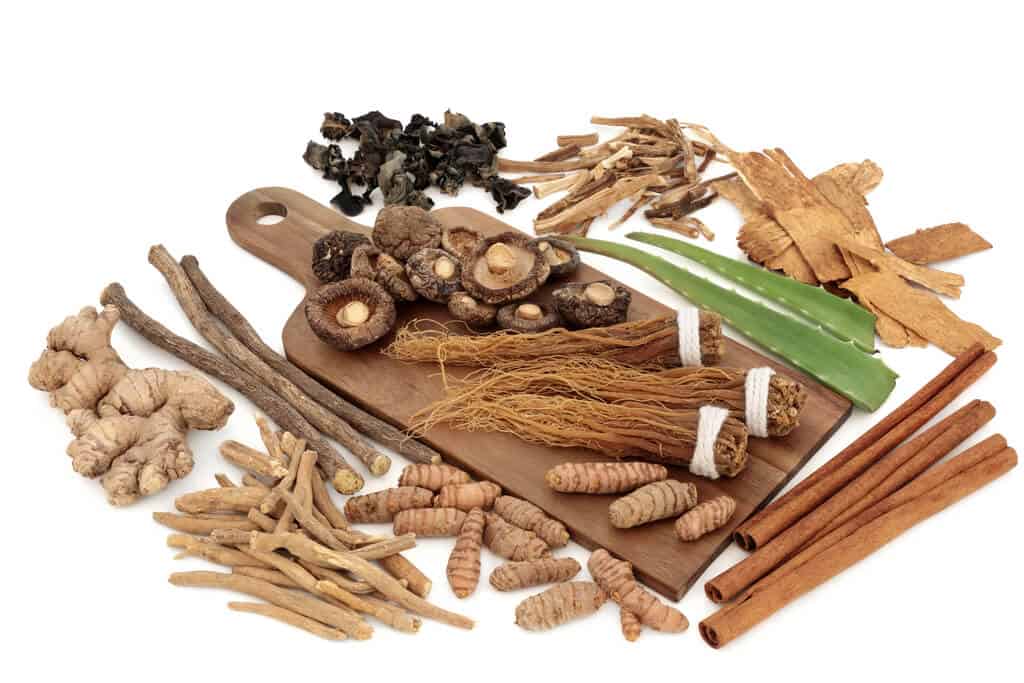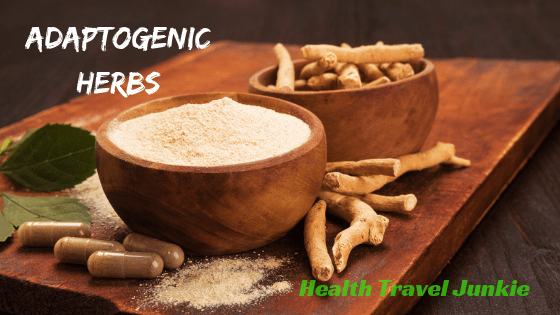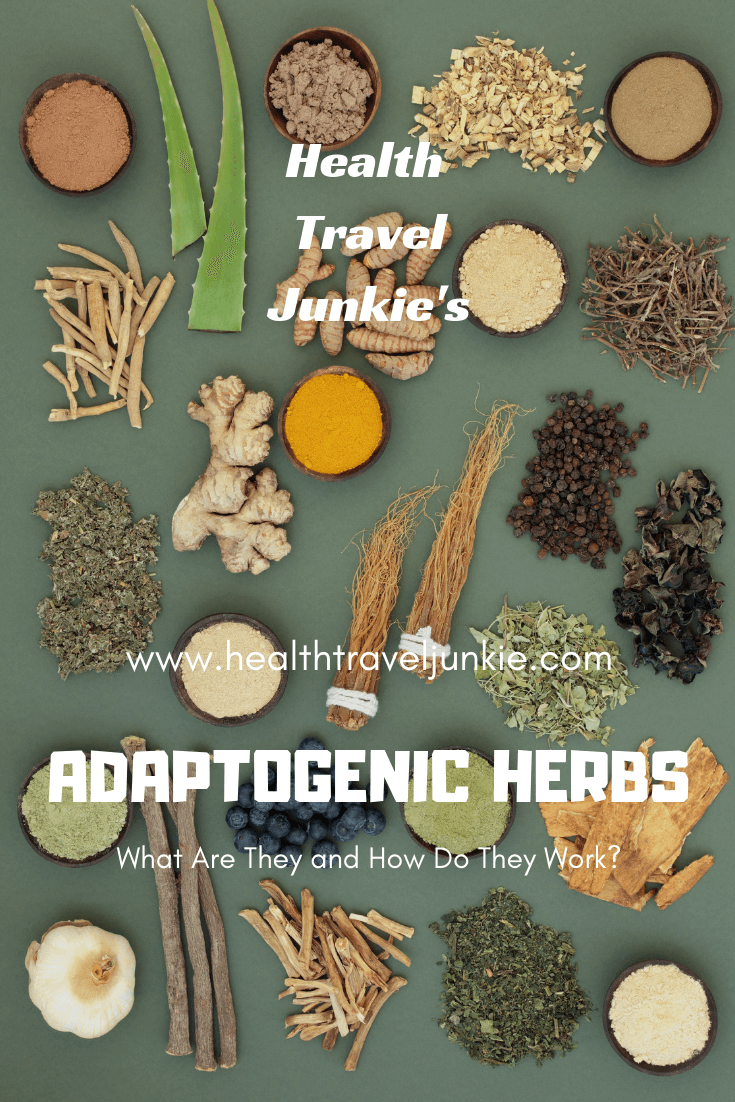Adaptogenic Herbs are a new trend in the herbal world, but does it live up to the hype? The world of herbology is an endlessly exciting and diverse place. Whether you’re using Licorice and Marshmallow Root to help with a sore throat, or you’re taking some Kava and Lemon Balm to soothe your nerves, almost every ailment has a botanical solution.
As you journey down into the rabbit hole of modern herbalism, you will inevitably stumble upon adaptogens. This includes herbs such as Ashwagandha, Rhodiola, Ginseng, and Tulsi. However, only a select number of herbs fully deserves the title: Adaptogenic herb.
Contents
Where Adaptogenic Herbs Came From
To fully understand the meaning and function of adaptogenic herbs, it helps to understand the origins of the term. In 1947, a Russian scientist by the name Nikolai Lazarev was studying and investigating the concept of a natural substance that could give individuals an overall state of stress resistance. Through rigorous experiments with local soldiers and athletes, he found Siberian ginseng to have this desired effect. Those who’d taken the herb were able to withstand the hard labor and maintain a level of energy remarkably higher than those who hadn’t. He then coined the term “adaptogen” as an herb that can cultivate a state of “nonspecific resistance,” and went on to find more plants with similar effects on the human body.
Years later, in 1969, pharmacologists Brekham and Dardymov further expanded on Lazarev’s definition. They determined that for a plant to truly own the title “adaptogenic”, it must have three pharmaceutical properties:
- Must be completely safe and non-toxic to the organism
- Must act non-specifically, giving the organism an overall state of resistance.
- Must regulate and normalize internal functions on a cellular level, supporting general homeostasis
While “state of nonspecific resistance” is an impressive concept, it still leaves questions as to how adaptogenic herbs work.
Stress, Adaptogens, and How They Interact
“State of nonspecific resistance” refers to stress, and how your body deals with stress. In life, there are (unfortunately) endless sources of stress, which can be sub-divided into categories like physiological, psychological or emotional. From the perspective of you, the stress-ee, let’s explain further. Back in the late 40’s, a man named Hans Selye wrote that there are two kinds of stress: eustress and distress. Your body deals with them in very similar ways. Eustress is stress that your body reacts to, overcomes, and is better off for it. Weight lifting and increasing your athletic performance through hard work and optimal recovery time are a perfect example of eustress. While distress is the kind of stress that, put simply, will run you into the dirt.
This is where our adaptogenic herbs come into play. What adaptogens do within your body is they help convert distress into eustress. They help you deal with stressors better so that you can overcome them and – quite literally – adapt!
To make things more transparent and understandable, let’s compare adaptogens to the concept of immunization. When your body is introduced to foreign molecules, your immune system creates a response to the stressor, while also “learning” the ability to quickly create a response to a subsequent attack. Adaptogens do something very similar but on a cellular level.
When the adaptogenic herbs interact with cells, they cause the cell just enough stress to generate proteins. This bolsters the cell. Any future stress the cell may deal with is handled with a measurably stronger level of tolerance.
The only negative side to Adaptogenic herbs is that much of the evidence in this field of research is experiential and subjective. Yet, many athletes swear by adaptogens, claiming it reduces muscle recovering time, soreness after training, while increasing physical stamina.
Which Adaptogenic Herb Should I Take?

If you’ve made it this far in the article, you’re likely a highly enthusiastic herb lover, eager to experiment with your first adaptogenic herb. Should you start with Tulsi? Ashwagandha? The original Siberian Ginseng? While many herbs are indeed adaptogenic, each will provide a unique experience. Plus, you’ve probably already consumed adaptogenic herbs like Ginger root, without realizing that it forms part of this special category of plants. Let’s lay out a few more adaptogen options.
Tulsi
Tulsi, also known by the names “Holy Basil” and “Liquid Yoga”, is a tasty, aromatic, and reasonably easy to find adaptogen to start your experimentation with. Though related to culinary basil, Tulsi has a rich history of its own, with deep roots in Ayurvedic medicine. It is often mixed into teas, tinctures, and sometimes encapsulated in supplements at health food stores. Its phytochemical content holds the potential to combat cancer, while also reducing blood cholesterol and stress. In addition, Liquid Yoga Herb, similar to physical Yoga, is believed to have a tonifying effect on the body and its organs
Ashwagandha
Often referred to as “Indian Ginseng” or “Winter Cherry,” the roots of this herb have been used by Ayurvedic medicine men for centuries. This adaptogen in particular promises remarkable effects on the brain and nervous system. During an animal study where the subjects were introduced to chronic stress, Ashwagandha was successfully used to help reduce overall cellular degeneration. Other studies indicate that Ashwagandha may be supportive of stress and anxiety, male and female sexual function, cardio-respiratory endurance, muscle strength, weight management as well as memory and cognition (1).
With Ashwagandha, my recommendation is to try it out yourself. Then objectively analyze after a set period of time if you experienced less stress daily or a higher level of everyday functioning. For example, journal your experience after 1 week, then 2 weeks, and next, after a month. Make sure you use the Ashwagandha at regular daily intervals. If you skip days in-between, your findings may be inaccurate.
Rhodiola Rosea
Rhodiola a.k.a. Arctic Root’s claim to fame is its potential in treating anxiety, fatigue, and depression. For example, during exam stress, theoretically, it’ll keep you mentally sharp. It grew in popularity when Russian scientists experimented with the herb to help athletes improve their performance. Growing in harsh conditions, in remote Arctic regions with cold weather and low oxygen, is believed to contribute to the plant’s medicinal benefits.
There are a few studies available online which indicate that there may be a scientific basis to its adaptogenic claims (e.g. through tests performed on lab rats). Yet, as with other adaptogens, these studies often do not lead to definite conclusions. Still, for the avid herb connoisseur, it’s worth further investigation and experimentation. Once again, journal your experience, and take note of (a) dosages used, (b) frequency of supplementation, (c) whether you skipped a day, (d) the supplement’s brand (e) pleasant and unpleasant side-effects along with (f) other factors influencing your well-being, e.g. whether you worked out or had a healthy meal on that particular day.
Schisandra Berries
As with other Adaptogens, a main use of the Chinese Schisandra berry is stress-relief. Other uses are anti-inflammation, skin-protecting, tonifying the liver, as well as enhancing physical performance and counteracting fatigue. Lastly, it holds potential as a chemotherapeutic herb for human gastric cancer (2).
I’ve briefly taken Schisandra both as a powder and in dried berry form. Yet, it was very hard to notice any direct benefit. Similar to taking a more famous adaptogen, e.g. Ginger root, it’s 100% certain that it does contain vitamins, and anti-oxidants, like all other fruits and vegetables. Thus it will definitely benefit your health (probably even more if it’s fresh). But whether these are miracle plants that’ll allow you to run a marathon “overnight” at a new Personal Best time, let’s leave that up to debate.
Conclusion – Adaptogenic Herbs
Not all adaptogens may be equally effective for your particular mental and physical constitution. Experimentation and trying different dosages is recommended. As always with herbs, practice safely, have fun, and enjoy your next nature crafted experience!
Warning: If you are taking prescribed medication, check with your doctor before supplementing with any adaptogenic herbs, as there could be counter-interactions.
Have you ever tried Adaptogenic Herbs? Which is your favorite adaptogen? Comment below with all tips and questions!
Click to Save on Pinterest:



Very interesting information!